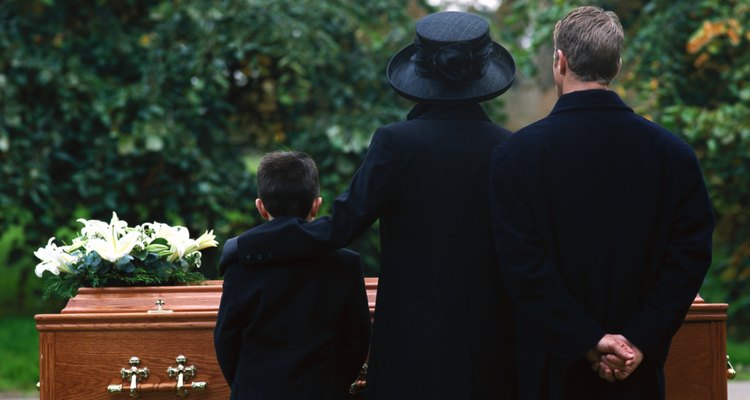
Dealing with the death of an uncle is difficult and is especially hard if you were close to him. The grief you feel is multi-layered: you feel sad for your own loss, for the cousins who lost their father, for the aunt who lost her spouse and for your parent who lost a sibling. Coping with the loss of an uncle involves grieving and supporting yourself and your family.
Identify and Process Your Own Grief
Bereavement expert Elizabeth Kubler-Ross identified five stages of grief: denial, anger, bargaining, depression and acceptance. Mental health professionals agree that these are healthy responses to loss that can happen at any time and in no clear order because grief is an individual process. Once you recognize these stages of grief as normal reactions, you can start to process and integrate your loss. Then you will be able to connect meaning to the loss, ultimately resulting in acceptance and the ability to move forward.
Provide Support to Your Aunt and Cousins
HelpGuide.org suggests that you be present for your aunt and cousins now more than ever. Although you may feel awkward and afraid that you will say the wrong thing, you don't have to give advice or have all the answers. "The most important thing you can do for a grieving person is to simply be there; your support and presence will help him or her cope." Sharing stories and remembering your uncle together as a family will be cathartic and healing for all.
Help Your Parent Grieve
Supporting your parent who has lost his or her brother requires that you understand not only the grief stages but also the sibling dynamic. The loss of a sibling can be marred by survivor guilt for the sibling who did not die and possibly guilt about how the sibling relationship was maintained. Perhaps the strongest emotion for adults who lose a sibling is the sudden fear for their own mortality. Provide a listening ear and understand that your parent may feel alone in his or her specific grief. Connecting your parent to an adult sibling grief support group can help.
Moving Forward
Mental Health America reminds those who are in the process of grief that it takes time to fully absorb the impact of a major loss. You may never stop missing the loved one, but the pain eases after time, and you will be able to go on with your life. Providing support to your family by talking about your uncle, sharing memories and creating special rituals to remember him daily and on special occasions like anniversaries will help the whole family grieve and ultimately honor the memory of your uncle.
Related Articles

How to Grieve With Someone Who Lost an ...

Dating After the Death of a Girlfriend

How to Accept the Death of a Loved One

How to Comfort a Friend After Their ...

Memorial Gifts for the Loss of a Mother

How to Deal With Your Stepmother When ...

Depression After the Death of a Spouse

How to Help Your Husband With the Death ...

How to Help Someone Going Through a ...

How to Help a Friend Whose Pet Died

How Do I Help My Ex-Husband Move On?

What to Say to Your Husband After His ...

Dating a Man Who Is Losing His Mother ...

Activities to Help Kids Deal With Grief

How to Get Over My Daughter's Divorce

The Effects on a Man Whose Mother Died ...

Moving on After Your Husband Dies

What to Do When a Spouse Leaves You

How to Thank People for Their ...

How to Support a Grieving Spouse
References
Writer Bio
Cate O'Reilly, who holds a Masters degree in social work, has worked with HIV widows and orphans in Zambia, chronically ill children in Ireland and maternal/child health in America. She has contributed to newsletters, developed protocol manuals and curriculum for education and public health forums.
Photo Credits
Stockbyte/Stockbyte/Getty Images